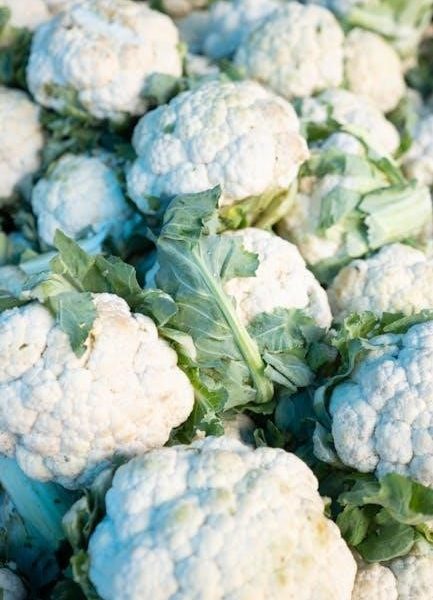A low-carb vegetarian diet combines the principles of vegetarianism with reduced carbohydrate intake‚ offering a unique approach to weight management and improved blood sugar control.
Understanding the Basics
A low-carb vegetarian diet focuses on reducing carbohydrate intake while avoiding meat and fish. It emphasizes plant-based foods like vegetables‚ nuts‚ seeds‚ and healthy fats. The diet typically limits daily carbs to 20-50 grams‚ promoting a metabolic state that burns fat for energy. This approach prioritizes non-starchy vegetables‚ moderate protein from sources like tofu and eggs‚ and healthy fats such as avocado and olive oil. By excluding grains‚ legumes‚ and starchy vegetables‚ it encourages a balanced macronutrient intake for better health outcomes.
Importance of a Balanced Diet
Importance of a Balanced Diet
A balanced diet is crucial for maintaining overall health and preventing nutrient deficiencies. While reducing carbs‚ it’s essential to focus on whole‚ nutrient-dense foods like vegetables‚ healthy fats‚ and plant-based proteins. This ensures adequate intake of vitamins‚ minerals‚ and fiber‚ which are vital for energy‚ digestion‚ and long-term well-being. A balanced low-carb vegetarian diet helps avoid common pitfalls like low energy levels or insufficient protein‚ promoting sustained health and vitality without compromising on flavor or variety.
Benefits of a Low-Carb Vegetarian Diet
A low-carb vegetarian diet promotes weight loss‚ improves blood sugar control‚ and enhances heart health by focusing on nutrient-dense foods and reducing carbohydrate intake effectively.
Weight Loss and Management
A low-carb vegetarian diet can aid in weight loss by reducing carbohydrate intake‚ which helps lower insulin levels and promote fat burning. High-fat foods keep you fuller longer‚ stabilizing blood sugar. Plant-based proteins like tofu and lentils‚ combined with fiber-rich vegetables‚ support satiety and portion control. This approach not only helps shed pounds but also maintains weight effectively‚ making it a sustainable option for long-term health and wellness.
Improved Blood Sugar Control
A low-carb vegetarian diet helps regulate blood sugar by minimizing carbohydrate intake‚ which reduces insulin spikes. Vegetables like spinach and kale‚ along with healthy fats and plant-based proteins‚ slow digestion and stabilize glucose levels. This dietary approach can be particularly beneficial for individuals managing diabetes or prediabetes‚ promoting consistent energy levels and enhancing overall metabolic health without relying on medication or extreme restrictions.
Enhanced Heart Health
A low-carb vegetarian diet supports heart health by reducing saturated fat and cholesterol intake. Plant-based proteins like tofu and lentils‚ along with healthy fats from avocados and nuts‚ help lower triglycerides and improve lipid profiles. The diet emphasizes whole‚ nutrient-dense foods‚ which are rich in fiber and antioxidants‚ further reducing inflammation and improving cardiovascular function. This approach can contribute to a reduced risk of heart disease and promote long-term overall well-being.

Key Components of the Diet
A low-carb vegetarian diet focuses on low-carb vegetables‚ plant-based proteins‚ healthy fats‚ and dairy or plant-based alternatives‚ ensuring balanced nutrition while minimizing carbohydrate intake.
Low-Carb Vegetables
Low-carb vegetables are rich in nutrients and fiber‚ making them ideal for a balanced diet. Spinach‚ kale‚ zucchini‚ mushrooms‚ broccoli‚ cauliflower‚ and asparagus are excellent choices. These veggies provide essential vitamins‚ minerals‚ and antioxidants while keeping carbohydrate intake low. Incorporating them into meals supports weight management and blood sugar control. Use them in salads‚ stir-fries‚ or as substitutes for higher-carb options like pasta to maintain variety and flavor in your low-carb vegetarian diet.
Plant-Based Protein Sources
Plant-based protein sources are essential for a low-carb vegetarian diet. Tofu‚ tempeh‚ edamame‚ and seitan are high in protein and low in carbs. Lentils and chickpeas‚ while slightly higher in carbs‚ offer fiber and nutrients. Nuts‚ seeds‚ and nut butters‚ like almonds‚ chia seeds‚ and peanut butter‚ provide healthy fats and protein. Eggs and Greek yogurt are also excellent options for vegetarians. These sources ensure adequate protein intake while maintaining a low-carb and balanced diet.
Healthy Fats and Oils
Healthy fats and oils are crucial for a balanced low-carb vegetarian diet. Olive oil‚ coconut oil‚ and avocado oil are excellent choices‚ providing essential fatty acids. Avocados‚ nuts‚ and seeds like almonds‚ walnuts‚ chia seeds‚ and flaxseeds are rich in healthy fats and nutrients. These fats support heart health‚ enhance nutrient absorption‚ and keep you satisfied. Incorporating them into meals adds flavor and variety while maintaining a low-carb and nutritious eating plan.
Dairy and Plant-Based Alternatives
Dairy and plant-based alternatives are essential for a low-carb vegetarian diet‚ offering rich sources of nutrients. Greek yogurt and cheese provide protein and calcium‚ while almond‚ coconut‚ and oat milk serve as low-carb dairy substitutes. These options ensure you maintain a balanced intake of essential vitamins and minerals without compromising on taste or nutritional value.
Challenges and Considerations
Managing carbohydrate intake and ensuring adequate protein are key challenges. The diet may feel restrictive‚ requiring careful meal planning to maintain nutritional balance and variety.
Managing Carbohydrate Intake
Managing carbs on a low-carb vegetarian diet requires careful selection of plant-based foods. Focus on low-carb vegetables like spinach‚ kale‚ and zucchini‚ while limiting high-carb options such as grains and legumes. Tracking daily carb intake helps maintain dietary goals‚ typically aiming for 20-50 grams per day. Incorporating healthy fats like avocados and olive oil supports satiety and nutrient absorption‚ making carb management both sustainable and enjoyable.
Ensuring Adequate Protein and Nutrients
On a low-carb vegetarian diet‚ it’s crucial to focus on plant-based protein sources like tofu‚ tempeh‚ and nuts‚ which are lower in carbs. Incorporate a variety of vegetables to maintain nutrient diversity and fiber intake. Consider supplements for B12 and omega-3 fatty acids‚ as these are typically found in animal products. Plan meals to include protein at each sitting and explore low-carb alternatives like cauliflower rice to satisfy cravings without exceeding carb limits. A balanced approach ensures you meet nutritional needs while adhering to your dietary goals.

Sample 7-Day Meal Plan
This meal plan offers a week-long guide to delicious‚ low-carb vegetarian dishes‚ including breakfast‚ lunch‚ dinner‚ and snacks‚ designed to keep you satisfied and on track.
Overview of the Meal Plan
This 7-day meal plan provides a structured approach to a low-carb vegetarian diet‚ offering balanced and nutritious meals designed to support weight management and blood sugar control. Each day includes breakfast‚ lunch‚ dinner‚ and snacks‚ carefully selected to ensure variety and satisfaction. Meals focus on whole foods‚ plant-based proteins‚ and healthy fats‚ with an emphasis on low-carb vegetables. The plan is tailored to approximately 1‚500 calories per day‚ with macronutrient balance to keep you fueled and focused. It’s adaptable to suit individual preferences and dietary needs while maintaining a ketogenic-friendly approach. Recipes are simple‚ flavorful‚ and designed to keep you on track with your low-carb vegetarian goals.
Breakfast Ideas
Start your day with delicious and nutritious low-carb vegetarian breakfast options. Try a spinach and avocado omelette‚ chia pudding with nuts‚ or full-fat Greek yogurt topped with berries. These dishes are rich in healthy fats and proteins‚ keeping you satisfied and energized. Incorporate tofu scramble with roasted vegetables for a hearty meal. Smoothies made with leafy greens‚ almond milk‚ and avocado are also great for a quick‚ nutrient-packed start. These ideas ensure a balanced and flavorful breakfast while adhering to low-carb guidelines.
Lunch Ideas
Enjoy a variety of nutrient-rich‚ low-carb vegetarian lunches; Salads with mixed greens‚ avocado‚ and nuts are a great option. Vegetable-based soups‚ like zucchini or spinach soup‚ are hearty and satisfying. Stuffed bell peppers with cauliflower rice and tofu offer a flavorful twist. Lentil or chickpea salads with olive oil and lemon dressing provide plant-based protein. Grilled or roasted vegetable wraps with hummus and leafy greens are also delicious. These meals are balanced‚ filling‚ and align perfectly with a low-carb vegetarian lifestyle.
Dinner Ideas
Dinner on a low-carb vegetarian diet can be both satisfying and nutritious. Try vegetable-based stir-fries with tofu‚ cooked in olive oil and seasoned with herbs. Cauliflower rice or zucchini noodles paired with lentil or mushroom sauces make hearty options. Stuffed bell peppers with quinoa‚ spinach‚ and ricotta are flavorful and filling. Grilled or roasted vegetable skewers with avocado and a side salad are also excellent choices. These meals ensure a balanced intake of protein‚ fiber‚ and healthy fats while keeping carbs low.
Snacks and Desserts
Snacks and desserts on a low-carb vegetarian diet can be delicious and satisfying. Opt for nuts‚ seeds‚ or veggie sticks with hummus. For desserts‚ try Greek yogurt with berries or dark chocolate. Chia pudding with coconut milk and a touch of vanilla is another great option. These choices are rich in healthy fats and protein‚ keeping carb intake low while satisfying sweet cravings. They also provide essential nutrients and fiber‚ making them ideal for a balanced low-carb vegetarian lifestyle.

Nutrient Considerations
A low-carb vegetarian diet emphasizes macronutrient balance‚ focusing on high-quality fats‚ moderate protein‚ and low carbohydrates. It prioritizes vitamins like B12 and minerals such as iron and calcium.
Macronutrient Balance
A low-carb vegetarian diet focuses on balancing macronutrients: low carbohydrates (20-50g/day)‚ moderate protein (15-25% of calories)‚ and high healthy fats (50-70% of calories). Emphasize plant-based proteins like tofu‚ lentils‚ and dairy alternatives‚ while incorporating healthy fats from avocados‚ nuts‚ and olive oil. This balance helps maintain energy levels‚ supports weight management‚ and minimizes nutrient deficiencies. Proper planning ensures adequate intake of essential amino acids and fatty acids‚ crucial for overall health and diet success.
Vitamins and Minerals
A low-carb vegetarian diet requires careful attention to vitamin and mineral intake. Key nutrients include iron from spinach and lentils‚ calcium from fortified plant milks‚ and vitamin B12 from dairy or supplements. Zinc‚ found in nuts and seeds‚ and vitamin K from leafy greens are also essential. Ensuring adequate intake of these nutrients supports immune function‚ bone health‚ and energy production. Regularly incorporating a variety of whole‚ plant-based foods helps maintain optimal levels and prevents deficiencies. Planning meals with fortified foods and supplements can further enhance nutrient adequacy.
Tips for Success
Plan meals in advance‚ incorporate healthy fats like avocado‚ and stay hydrated. Track progress and seek support to maintain motivation and consistency on your journey.
Meal Planning and Prep
Meal planning is essential for success on a low-carb vegetarian diet. Create a weekly plan‚ shop for fresh ingredients‚ and prep meals in advance to save time and reduce food waste. Organize your grocery list around low-carb vegetables‚ plant-based proteins‚ and healthy fats. Consider pre-chopping veggies or cooking batches of grains like quinoa for quick meals. Use digital tools or calendars to stay organized and ensure you never miss a nutritious meal. Consistency is key to maintaining your dietary goals.
Staying Motivated
Staying motivated on a low-carb vegetarian diet requires consistent effort and a positive mindset. Track your progress through journals or apps to visualize improvements. Share your goals with friends or join online communities for support and accountability. Celebrate small victories‚ like reaching a new personal best‚ to maintain enthusiasm. Remind yourself of the benefits‚ such as improved health and energy‚ to stay committed. Explore new recipes and stay inspired by the long-term advantages of this lifestyle.

Additional Resources
Explore books like The Low-Carb Vegetarian Cookbook and Keto Vegetarian for detailed guides. Online forums and communities offer support‚ while websites provide meal plans and expert advice.
Recommended Reading
For a deeper understanding‚ explore books like The Low-Carb Vegetarian Cookbook and Keto Vegetarian‚ offering tailored meal plans and nutrition insights. These resources provide practical guidance on combining low-carb principles with plant-based eating. Additionally‚ online e-books and PDF guides‚ such as Low-Carb Vegetarian Diet Plan‚ offer structured approaches to meal prep and lifestyle adjustments. These materials cater to both beginners and experienced dieters‚ ensuring a comprehensive understanding of the diet’s benefits and implementation.
Online Communities
Joining online communities can provide valuable support and inspiration for following a low-carb vegetarian diet. Platforms like Facebook groups‚ Reddit forums‚ and specialized websites offer spaces to share recipes‚ ask questions‚ and connect with others on a similar journey. These communities often feature expert advice‚ success stories‚ and tips for staying motivated. Engaging with others who understand the challenges and benefits of this diet can help you stay on track and discover new ideas for meals and lifestyle adjustments.
A low-carb vegetarian diet offers a sustainable and flexible approach to improving health and weight management. By focusing on nutrient-rich‚ plant-based foods and mindful carbohydrate intake‚ this diet promotes long-term well-being. With proper planning and support‚ individuals can thrive on this diet‚ enjoying delicious and varied meals. For those considering this path‚ consulting with a healthcare professional or dietitian can provide personalized guidance‚ ensuring a safe and effective journey toward healthier living.



